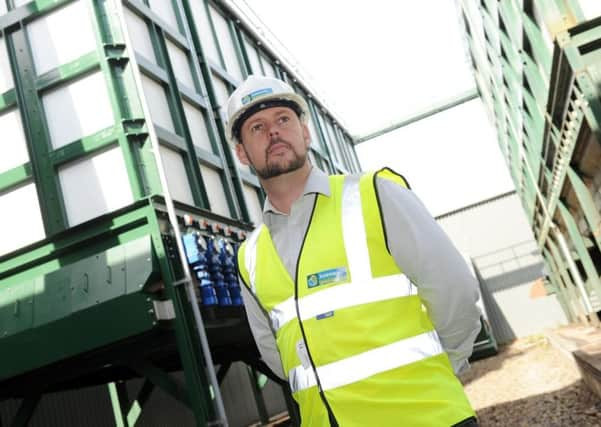Monday Interview: Grant Keenan of Keenan Recycling


Looking at himself objectively, Grant Keenan accepts that he is “probably unemployable”. From the age of 17, when he set out on his first job selling oil paintings door-to-door, he has progressed through a series of vocations linked only by the fact that they accommodated his craving for independence.
So there was pause for thought last year before he and his family decided to bring a major external investor into Keenan Recycling, the organic waste disposal firm based out of New Deer in Aberdeenshire. Business Growth Fund’s £2.2 million injection didn’t give it control over the company, but its 30 per cent stake clearly raised accountability among the firm’s founders.
Advertisement
Hide AdAdvertisement
Hide Ad“It was quite a thought to give up equity, but we felt we had taken the business as far as we could,” Keenan says. “We are always constrained by cash because we are growing so quickly, and we wanted to take the next step up.”
Since opening its newest office in Linlithgow less than a year ago, Keenan Recycling’s operations in the Central Belt have grown to overtake those in its Aberdeenshire base where it began reclaiming grass clippings in 2001.
The company collects food waste from about 2,600 hotels and restaurants in the Central Belt, putting it comfortably ahead of the north-eastern client base of roughly 2,400.
Total revenues for the year to the end of March are expected to reach £6m, and with both organic growth and acquisitions on the horizon, a strong upward trajectory looks set to continue.
Turnover in the Central Belt is expected to “at least” double in the coming year following a further tightening of regulations on food waste in Scotland. As originally introduced in 2014, government law mandated recycling by businesses producing 50 kg or more of food waste each week, but as of January that target was slashed to 5kg.
Keenan Recycling is also on the cusp of signing a major contract to collect domestic waste on behalf of a local council in Scotland. That deal is expected to be in place ahead of acquisitions that will take the privately-owned firm into the north-east of England within the next six months.
“In England there is not any legislation at the moment,” says Keenan, who already has two takeover targets in his sights.
“That is only in Scotland, but it will eventually happen in England, and that is why we want to get in there quickly and get established.”
Advertisement
Hide AdAdvertisement
Hide AdHe expects the company, which currently employs 63 people, to reach turnover of £30m-£40m within the next five years, with earnings running at about 10 per cent of revenues. It will represent an impressive journey for a business that came into being by chance, but Keenan believes he holds the keys to further expansion.
After a school career that spanned a number of establishments as his family moved around the country, Keenan had no clear idea of what he wanted to do next. The only certainty was that he had no interest in university, and so found himself in door-to-door sales.
“That taught me quite a few valuable lessons,” he recalls. “One was about how to handle rejection. Selling door-to-door can be really tough, and I remember talking to the guy who supplied the paintings after one particularly bad day. What he told me was to remember that every door that gets closed in my face brings me one door closer to my next sale.”
By the age of 19 Keenan had started his first business supplying paraffin, peat briquettes and similar items to fuel forecourts throughout Aberdeenshire. His range of goods eventually came to include garden bark, which led him to buy a grading machine.
In a bid to find additional uses for this relatively expensive piece of kit, Keenan went to the rubbish depot in Mintlaw to see if he could strike up a deal with the council. His original proposal fell through, but on the way out he noticed an enormous mound of grass clippings due to go to landfill.
“I didn’t really know anything about landfill or recycling,” he says. “But it seemed a waste to me, and it struck a chord.”
By 2003 he was collecting garden waste from tens of thousand of homes through local councils.
His wife Claire was also working in the business, and in 2004 Keenan’s brother, Gregor, joined a well.
Advertisement
Hide AdAdvertisement
Hide AdThe move into food waste came a few years later with the construction of an in-vessel composting plant on 12 acres owned by father Mel, who also invested in the company to cover part of the £3.2m cost of the project.
Mel became chairman of the company, a job he held up until last year’s appointment of Aberdonian entrepreneur Jim Clark to that post.
Clark is the founder of oil and gas waste management company MSIS, but just as importantly for Keenan Recycling, he also has an extensive track record in acquisitions and disposals.
“That was part of the reason for Jim’s appointment to the board,” says Keenan. “He has bought and sold so many businesses – about 160 I think – and that will be invaluable for us as we start expanding into England.”
30-second cv
Born: Falkirk, 1973
Education: Ellon Academy, McLaren High School
Ambition at school: To be honest I had no idea what I wanted to do at school
First job: Door-to-door salesman of oil paintings
Can’t live without: Probably my computer
Favourite city: New York
Kindle or book: Probably a book. I am pretty old-fashioned that way
Preferred mode of transport: My car – a Range Rover
What makes you angry: People who have a negative attitude
What inspires you: I admire and am inspired by people who have a vision and execute it
Best thing about your job: The freedom – I don’t have a boss or anyone telling me what to do